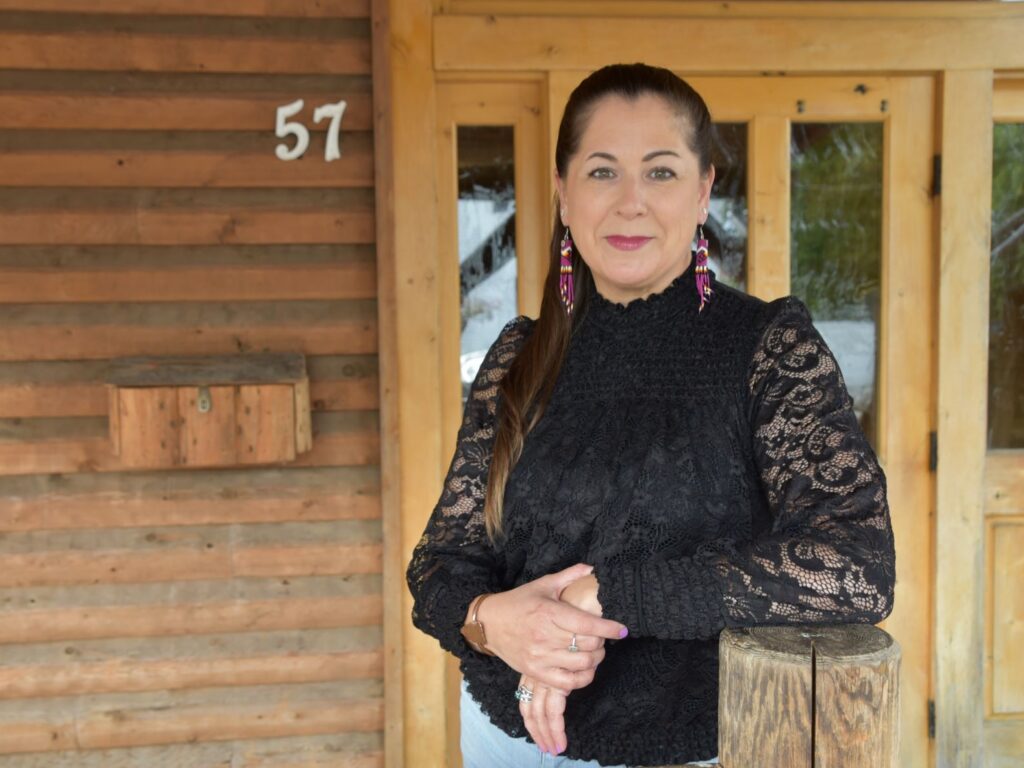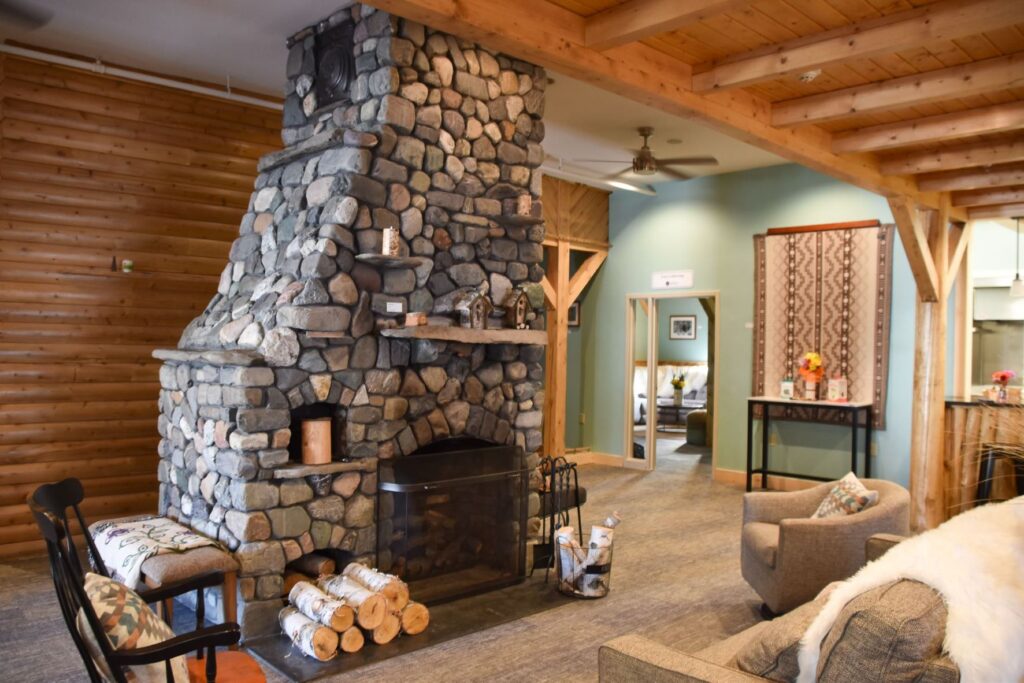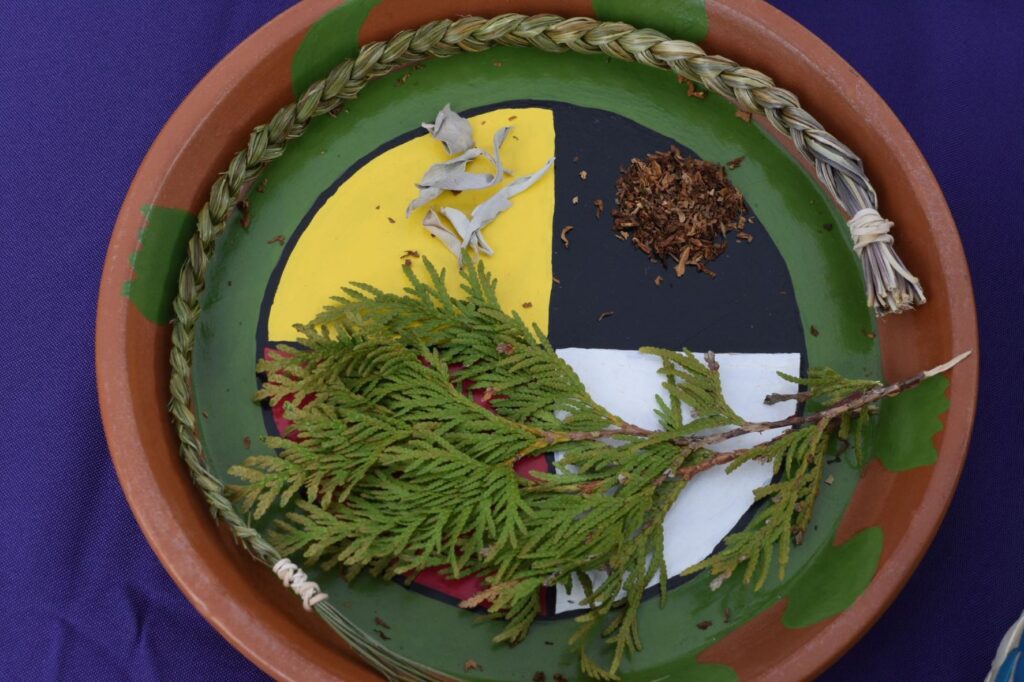
Lisa Sockabasin, co-CEO of Wabanaki Public Health and Wellness.
A new Wabanaki center provides culturally relevant mental health services
A large, stone hearth welcomes guests to The Healing Lodge in downtown Millinocket, with Wabanaki art on its walls and Native textiles that cover plush couches.
While the space has a warm, rustic feel, it houses an intensive outpatient program with cognitive behavioral therapy, group and individual therapy, and medication-assisted treatment for substance use disorders.
In Maine, Wabanaki Public Health and Wellness (WPHW) is working to address the mental health of Wabanaki people across the state at The Healing Lodge, which opened late this spring. The healing space is needed now more than ever.
Depression and anxiety soared across the country during the height of the COVID-19 pandemic. But Indigenous communities already faced disparities in health care and higher rates of suicide and substance use disorders due to systemic inequities.
Indigenous communities are more likely to report alcohol and substance use disorders than any other race, according to the Indian Health Service. Suicide rates for native people are 1.6 times higher than any other race in the country.

The Healing Lodge in downtown Millinocket.
"During the height of the pandemic, we knew that support for mental health was just as important as food and shelter - for those new to this level of strain, and for those who are already fighting against difficulties," said Lelia DeAndrade, MaineCF vice president of community impact. "WPHW is an organization that connects to people with respect, works within the appropriate cultural context, and understands the many layers of experiences that inform how we function and thrive in times of crises."
MaineCF recognized the need for crisis intervention funding during the pandemic. In 2021, MaineCF granted $465,000 to mental health services, including $25,000 to WPHW. Donors with advised funds at MaineCF have recommended more than $130,000 in grants to WPHW since 2020.
Last year, a paper published by the American Psychological Association concluded that health care providers must consider the impact of colonization on generations of Indigenous people and incorporate alternative healing methods into their mental-health services.
WPHW Co-CEO Lisa Sockabasin, a citizen of the Passamaquoddy Tribe at Pleasant Point, says culturally relevant healing spaces are integral to recovery for Indigenous people. WPHW's services combine modern medicine with Indigenous healing traditions.
The Gathering Place, a 50-acre property in the shadow of Mount Katahdin, is a multipurpose campus with 40 campsites, a sweat lodge, and other modes of healing. Together, The Gathering Place and The Healing Lodge offer a comprehensive, culturally centered healing experience for Indigenous people.
"Mount Katahdin has been a sacred mountain for us for thousands of years and it's a part of so many of our ceremonies and healing journeys," Sockabasin said. "We know that people who are disconnected from their culture need the land."
Residents of WPHW's recovery homes come to The Gathering Place for healing, whether it is to stay at a campsite, have a sweat, or work in the greenhouse.
"It provides what we need for healing: land, culture, ceremony, and each other," Sockabasin said.

Sacred medicines used for healing at Wabanaki Public Health and Wellness. WPHW photos
Healing circles, talking circles, and smudging ceremonies are among traditional Indigenous practices used in WPHW's mental health and substance use disorder treatment, along with medication and other therapies.
"It's not unusual for our medical director to hold a healing circle. Many of our traditional ceremonies are incorporated in all of our work," Sockabasin said. "Being connected to nature, the culture, the language, our elders — all of that is important."
Non-Native people also benefit from WPHW's work. This fall, WPHW will open The Cedar Way in Bangor, a much-needed detox center for anyone who needs it. Sockabasin says all clients will benefit from both medical and traditional native healing.
"l do think we have something to offer and I do think this is how people heal," said Sockabasin. "All people."
Wabanaki Public Health and Wellness is the winner of a $5 million grant from the US Department of Agriculture.
To learn more about the work of WPHW, listen to our podcast with Lisa Sockabasin below.
How philanthropy helps
- Flexible funding for nonprofits is always welcome and needed as health care providers try new program models, pivot to new needs, and provide emergency assistance.
- Larger grants can support pilot programs, such as a position to support student interns.
- Smaller grants can support gas cards, transportation, groceries, and personal items.
- Donors with advised funds can use MaineCF's Giving Together platform to find mental health-related projects.
- Donations to the Invest in Maine Fund allow MaineCF to direct your gift to emerging needs.





